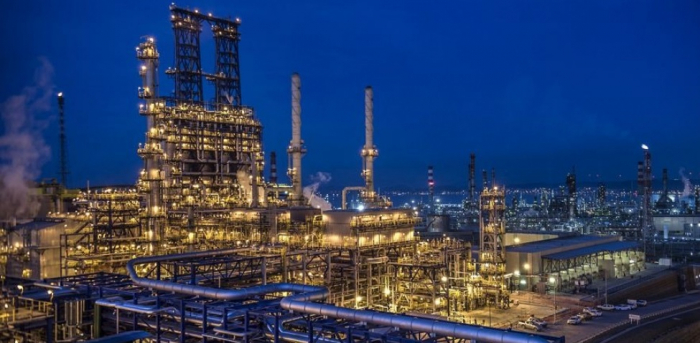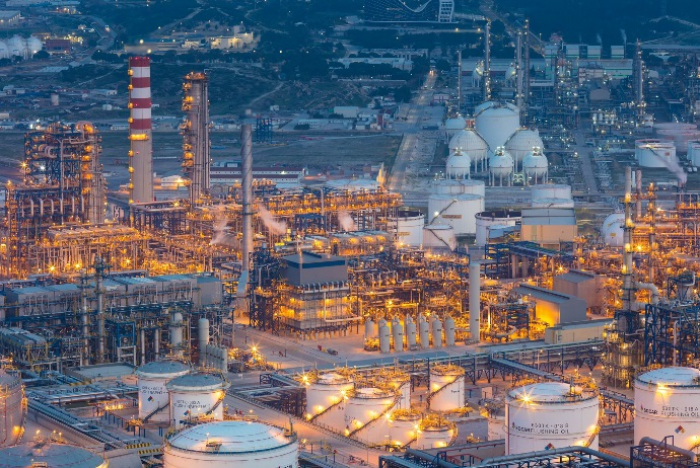All the Caspian countries are rich in oil and mainly export it raw. The region’s oil is processed somewhere else, far away. Why, oil refining is a special branch of business, and we can certainly develop it. Can Azerbaijan process the oil produced in neighbouring countries in the near to mid-future? What opportunities and challenges does the field put forth?
Ilham Shaban, head of Caspian Barrel Oil Research Centre clarifies the matter at hand in his interview with AzVision.az. He elaborates that the prospect was kept in mind as the Heydar Aliyev Baku Oil Refinery was modernized back in 2015. They assumed 8 years ago that ‘Azneft’, the production union at SOCAR, would not be able to fully supply the refinery, which would require shipping oil from elsewhere. The devices have been designed accordingly.
‘If oil produced locally does not suffice, but the country wants to make a profit from refinery all the while, doing so at the expense of imported oil is a widely used practice. This is nothing new. Azerbaijan has decided to boost the capacity at the processing plant from 6 million tons to 7.5. The Heydar Aliyev refinery will be at the capacity to process 7.5 million tons of oil as the modernization works are completed. By that time, that is after 2025, Azneft will produce even less than 5 million. An enterprise must work at its project capacity to be profitable and pay off the investments. Drawing imported oil into the refinery could be an option.’
- How possible is it for Kazakhstan and Russia to cooperate with us in this field?
‘Besides Russia and Kazakhstan, we must also consider Turkmenistan. The oil produced there is closest to the Azerbaijani one in terms of its geological properties. It can be adapted to the parameters at processing facilities without any additives.
Russian oil is also a very reliable source for us in terms of raw materials. Azerbaijan already imports Russian oil from the sea field on the border with Dagestan. We would be quality-wise satisfied with importing and sending it for processing.
The Russian oil produced in the Caspian started being transported through the Baku-Tbilisi-Ceyhan route in 2015. The official bulletin by the Azerbaijan State Statistical Committee reads that we have imported over 800 thousand tons of oil from Russia. If there is no data in transit, that oil goes straight for processing.
Alexander Novak, Russian Deputy Prime Minister, noted in his meeting with Parviz Shahbazov, Azerbaijani Minister of Energy, that Russia could supply larger amounts of oil for processing to Azerbaijan through Tikhoretsk-Baku (more popular as the Novorossiysk-Baku) pipeline, whereas Azerbaijan could direct its oil at exports.
Considering the Baku-Novorossiysk pipeline is currently non-operational, I conclude that the oil, produced by Lukoil in Dagestan waters is shipped to Azerbaijan by sea and sent for processing at the Baku Oil Refinery.’

- Could the finished products of the processed Russian oil be exported directly from Azerbaijan without returning them to Russia?
‘Statistics show that we indeed receive a large amount of oil from Russia. But we also do from Turkmenistan and Kazakhstan. We are not talking of transit, which is always cited separately, but of official import. Their commercial effect is different. The oil from Russia is directed at our refinery, while we forward the oil we would otherwise process to foreign markets.
We have imported 62 thousand tons of oil from Kazakhstan these 9 months. Our imports from Turkmenistan are even larger. Once the oil is processed here, the finished products are not shipped back to those countries, because they own sufficient refineries themselves. They, too, export both crude oil and finished products. While we receive oil from them, we also add in the costs for processing and transport. We then subtract these expenses from the prime cost and divide the remaining products with them. Both Kazakhstan and Turkmenistan are interested in cooperating with us in this regard. The official statistics also show that the exports of oil refinery products have increased in the current year.’
- The United States of America has built factories specifically to process Venezuelan oil. How popular and profitable is this practice internationally?
‘Since the very beginning of the Age of Oil, all the crucial innovations in the field have belonged to the USA. They have both the know-how and the technologies. The oil refinery commissioned by Azerbaijan State Oil Company in Izmir in 2018 was a unique event for that region because there had not been a plant of such technological advantages in South Europe, North Africa, the Middle East, the Caucasus, or Central Asia in the previous 15 years. The project work was drawn up by an American company. There is neither a country, nor a company in the world that could equal the US in terms of processing depth, quantity of products obtained from a ton of crude oil, or environmental issues. Therefore, they can find it a feasible option to import oil from Venezuela and refine it locally. The US processes 16-17, sometimes even 18, million barrels of oil a day. 6 million of this is imported oil. They import oil through pipelines both from Latin America and Canada.
We cannot compare ourselves to the US in this regard. But we could benefit from the existing business model. Europe has declared that it will completely stop importing and consuming conventional energy by 2050. But Europe is only one part of the world. We must maintain our refineries, build connections with other markets and conduct trade, thus turning traditional energy into capital for ourselves. All 5 Caspian countries are wealthy in terms of traditional energy carriers.’
- Are there any other countries, besides America, that can benefit from processing oil, produced elsewhere?
‘Take the entire southern Europe, Britain, or the number one economic powerhouse in Europe, Germany. They do not have oil of their own. But since they have extensive oil and petrochemical facilities, they can earn by selling refined oil both locally and abroad.’
Sahil Isgandarov
AzVision.az
More about:













































